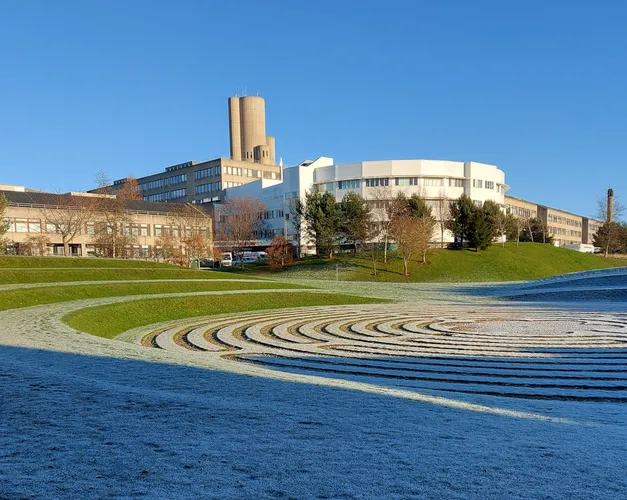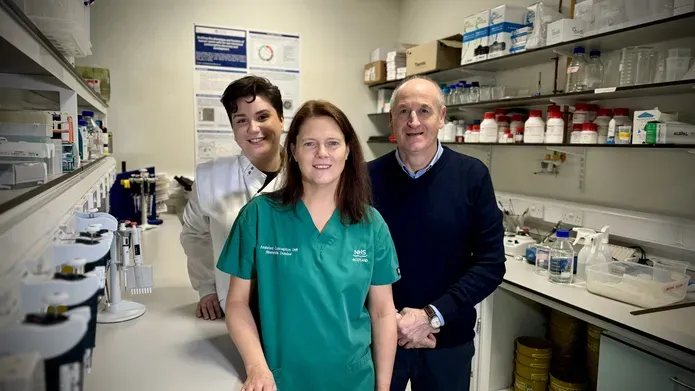Press release
International study on male infertility launched to advance development of new non-hormonal female contraceptives
A collaborative team of reproductive scientists from across Europe has received $5million in funding from the Gates Foundation.
Published on 4 March 2025


(L-r) Dr Zoe Johnston, Sarah Martins da Silva, Chris Barratt
The global effort to identify the causes of male infertility will improve reproductive medicine and support research into novel non-hormonal contraceptives.
A team of basic and clinical scientists from University of Münster, University of Birmingham and University of Dundee will work together to deliver cutting-edge insights and drive innovation in reproductive science.
Gender inequality remains a significant global problem, one which is self-evident when it comes to family planning and contraception. Creating new non-hormonal contraceptive methods will not only improve health outcomes for women and girls, but can also provide greater freedom to pursue education, employment, and development opportunities. More than 200 million women worldwide have an unmet need for modern contraception, and many believe the key lies in targeting sperm. But after decades of overlooking the male role in fertility, we simply do not have the tools to test these potential advances.
The international research team will address this gap by developing and validating novel sperm assessments, and systematically examining the function of sperm from 1,000 fertile men who have naturally fathered children. In comparison, they will investigate the sperm of 1,000 men with unexplained infertility to identify differences in functional sperm parameters between fertile and infertile individuals which can then be used to test new concepts for female contraceptives.
Professor Timo Strünker from the Centre of Reproductive Medicine and Andrology (CeRA) of the University of Münster, spokesperson for the research consortium, said, "We are confident that the insights gained from this study will have the added benefit of significantly improving early diagnostics of male infertility and clinical care for affected couples."
In fact, in about a third of infertile men, semen parameters remain within normal ranges. This condition, known as unexplained male infertility, involves functional defects of the sperm that cannot be detected through traditional semen analysis
This will be the first time a direct comparison is made between fertile and infertile males with the most modern sperm-assessment tools at this scale. Participants will be recruited from all three countries, and the diversity provided across these populations should help ensure that results are widely applicable.
Dr. Meurig Gallagher, School of Medical Sciences, University of Birmingham, said, “A key new observation of sperm will be the detailed analysis of their tail beat using a new analytics software, ‘FAST’, developed in Birmingham. These tail beat patterns act like a “fitness test” of sperm capability.”
Understanding the functional differences in sperm from fertile and infertile men shall inform drug discovery programs aimed at developing small molecules that specifically target sperm in the female reproductive tract, preventing the sperm from fertilizing the egg. Advancing such innovative, female-controlled, non-hormonal contraceptives is an important global concern.
The study has just begun and is expected to conclude within two years. It will be coordinated by Prof. Timo Strünker, Prof. Sabine Kliesch, Dr. Christoph Brenker (CeRA), and Prof. Frank Tüttelmann (Centre of Medical Genetics) at the University Hospital and University of Münster, the primary recipient of the funding award. It is conducted in collaboration with Dr. Sarah Martins da Silva, Dr Zoe Johnston and Prof. Christopher Barratt from Ninewells Hospital and Medical School at the University of Dundee, as well as Prof. Jackson Kirkman-Brown (Centre for Human Reproductive Science) and Dr. Meurig Gallagher (Metabolism and Systems Science) at the University of Birmingham.
Press Office, University of Dundee
[email protected]